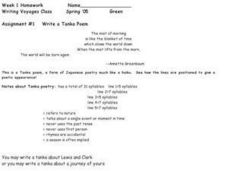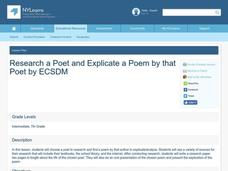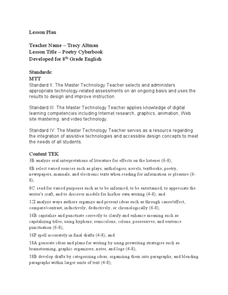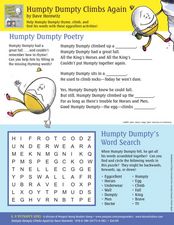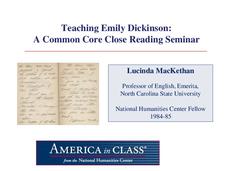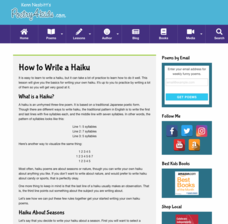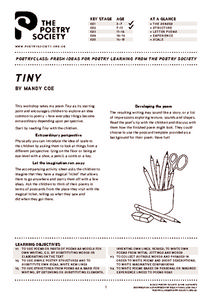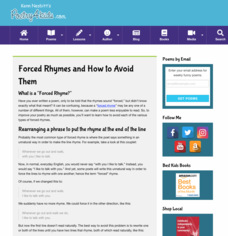Curated OER
Animal Acrostic
In this animal acrostic worksheet, students read a short poem. Afterward, they answer questions about the poem and then write their own acrostic poetry. Students share their poetry with a friend, and guess what type of animal is described.
Curated OER
Write a Tanka Poem
In this Tanka poem worksheet, 6th graders analyze a Tanka poem for number of syllables and content parameters, then write one about a journey, real or imagined using the 6 step writing process.
Curated OER
Sound poems
Third graders write a class poem based on the use of sound to create effects. They investigate use of onomatopoeia and how to write in a tight structure.
Curated OER
Research a Poet and Explicate a Poem by that Poet
Seventh graders choose a poet to research and find a poem by that author to explicate/analyze using a variety of sources for their research that will include their textbooks, the school library, and the internet. After conducting...
Curated OER
Searching for Meanings Beneath the Surface of the Poem
Young scholars analyze poetry. For this cultural perspectives lesson, students read the poem "Soccer Until Dusk" by Mark Brazaitis. Young scholars analyze the poem and consider the cultural perspective it reveals.
Curated OER
Language Play
Introduce your scholars to onomatopoeia and alliteration using a language elements worksheet. They examine six sound words and match them to four pictures. Next, learners read two examples of alliteration and write one of their own. They...
Curated OER
The Last Lecture: Found Poem
To focus attention on key concepts and vocabulary words in The Last Lecture, readers use power words drawn from the text to craft found poems.
Curated OER
Poetry Cyberbook
Emerging poets design a website and then post seven original poems as well as their written critique of these poems. Although the resource mentions Inspiration and FrontPage technologies, any software could be substituted.
Curated OER
Humpty Dumpty Poetry
In this Humpty Dumpty instructional activity, students complete a poem, word search, and maze revolving around the poem Humpty Dumpty. Students complete 3 activities.
Cloud Front
Grammar Camp Worksheet Packet
Whip your students' grammar skills into shape with this series of practice worksheets. Touching on all eight parts of speech, these exercises challenge learners to identify the relationships between different words and phrases in sample...
Curated OER
Impersonating Great Poets Using "Science Verse" by Jon Scieszka
A great way to bring poetry and parody into your language arts classroom, this lesson mimics famous poems based on Jon Scieszka's Science Verse. The activity not only allows the class to see examples of poem parodies, but to create their...
Monarch High School
TP-CASTT Practice
Acronyms can help learners remember facts and analyze poetry. This resource includes graphic organizers for TP-CASTT, SOAPS, SOAPSTone, and DIDLS. Class members can try out one or all of these strategies to assist with that difficult job...
National Park Service
The Poet's Toolbox
If you need a lesson for your poetry unit, use two poems by Henry Wadsworth Longfellow ("Rain in Summer" and "The Slave in the Dismal Swamp") and a resource on Elements of Poetry. The lesson plan guides you through activities on...
National Humanities Center
Teaching Emily Dickinson: A Common Core Close Reading Seminar
Three of Emily Dickinson's poems, "I like to see it," "Because I could not stop for Death," and "We grow accustomed to the Dark," provide instructors with an opportunity to model for class members how to use close reading strategies to...
Poetry4kids
How to Write a Clerihew
Writing funny poems is the best part about learning poetic forms! Young poets learn all about clerihews—humorous four-line poems about people—with an explanatory lesson.
Worksheet Web
What did it Say? – Summarizing
Provide scholars with an opportunity to practice summarizing text with a two-page learning exercise. Learners read poems, share stories with their peers, and summarize their new-found-knowledge.
National Endowment for the Humanities
Lu Shih — The Couplets of T’ang
Writing poetry in ancient China was the modern equivalent of sending a greeting card. Scholars learn about the ancient Chinese poetic form called the lu shih. They read about the context of poetry during the T'ang Dynasty and complete a...
Poetry4kids
How to Write a Haiku
A haiku is the focus of an activity that challenges scholars to draft an original poem. Authors discover the origin and components of a haiku, read three example poems, then follow six steps to compose their own.
Poetry Society
Tiny by Mandy Coe
Introduce magic and imagination into your classroom with a poetry activity. Learners read the poem "Tiny" by Mandy Coe and use their magic tickets to visit any place they can think of! The final result is a poem describing where they...
Penguin Books
A Teacher's Guide to the Signet Classic Edition of Beowulf
Beowulf, the Old English epic hero, comes alive again in the activities found in a teacher's guide designed to accompany a reading of the classic poem.
Harper Collins
Every Thing On It Lessons and Activities
Honor the great poet, Shel Silverstein with eighteen activities and lessons showcasing his collection of poems from the book, Every Thing On It. Activities challenge scholars to rhyme words, make inferences, recite a poem, and more!
Teach It Primary
The Pied Piper of Hamelin
Six tasks make up a lesson plan designed to reinforce comprehension and language skills using the poem "The Pied Piper" by Robert Browing. Scholars discuss and define unknown words, identify adjectives and onomatopoeia, review complex...
Poetry4kids
Forced Rhymes and How to Avoid Them
Ready to take your poetry writing to the next level? Use an independent lesson to iron out all those forced rhymes, wrenched rhymes, and near rhymes from first-draft poems.
Harper Collins
The Giving Tree Anniversary Teaching Guide
Celebrate poetry month all of April with a guide that uses six of Shel Silverstein's most famous books as a basis for the lessons. Discussion questions and writing activities are provided for each of Silverstein's books.



